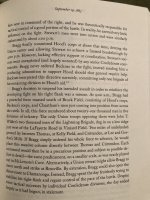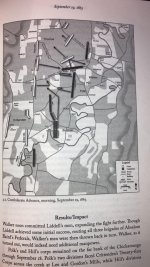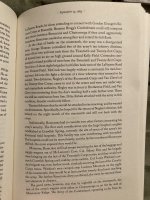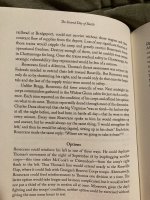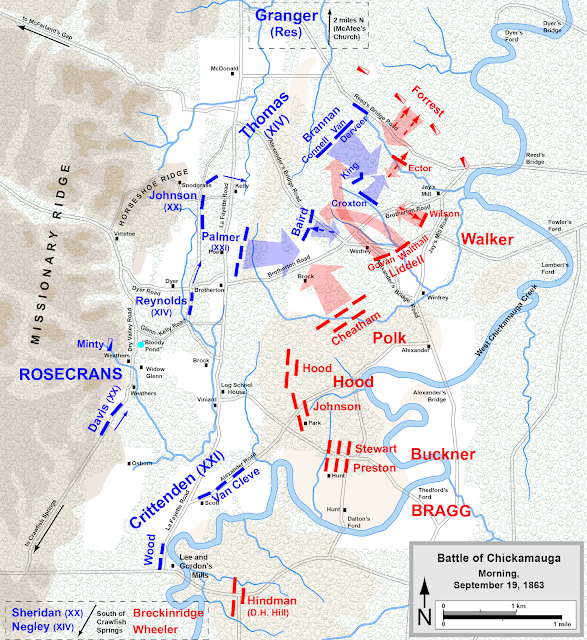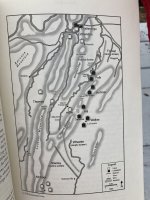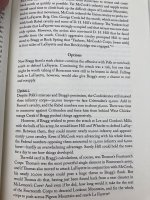History Learner
Well-known member
With the 160th anniversary of the Battle having just taken place (The reenactment is this weekend, highly encourage everyone to come!), I felt a thread was in order.
Historically, while successful in derailing Federal efforts into Georgia until the following campaign season, the Confederate success was "fruitless"; the Army of the Cumberland was able to survive and Bragg's Army of the Tennessee failed to recapture the critical rail hub of Chattanooga. The failed siege and resulting Federal retention of that crucial city would thus set the stage for the Atlanta Campaign in 1864, which would be a Union success and allow for the re-election of Lincoln. However, it did not have to be this way as noted by Dave Powell, who is generally considered the modern expert on the battle. In fact, Bragg had a golden opportunity on the morning of the 19th to divide the Federal Army in two and defeat it in detail:
By moving forward his forces, Bragg would have smashed Crittenden in his exposed flank. More importantly, this would've cut off the means of retreat to Chattanooga for the five divisions under Crittenden and McCook, and allowed Bragg to focus his other Corps solely upon the remaining five divisions under Thomas to the North. Cut off in McLemore's Cove, Crittenden and McCook both would've both been forced to surrender on the 20th, cut off as they were from supply and any viable means of escape in McLemore's Cove. To get an idea of the situation, attached is the tactical map of the situation on the morning of the 19th, from Dave Powell's Decisions at Chickamauga (and from where our PoD comes from, also):
This would also create a very serious situation for Thomas as the 20th arrived, as he would not receive Negley's Division and would thus have a seriously exposed left flank. Even worse, with the Federal Army divided in two by Bragg's actions, Longstreet's Corp would be going into combat fresh against a much weaker, more exposed Thomas than IOTL. It thus stands to reason Thomas would be much more easily routed, with higher casualties, than historically occurred:
Even worse, seven of the Army's 10 divisional hospitals filled with wounded are at Crawfish Springs, while two brigades of cavalry and a fair portion of the Army's supply train would likewise be exposed to destruction by the Confederates. Between those losses, Thomas being routed off the field and roughly five divisions being forced to surrender, you're easily looking at 35,000 losses by the Army of the Cumberland, which would have to abandon Chattanooga and likely fall back on Nashville given a now decisive Confederate numerical advantage and the loss of sufficient supply capacity with the damage to the baggage trains.
This would definitely not be a fruitless victory, and could very easily set the stage for French intervention to end the war or so damage the Federal war effort as to allow a peace by exhaustion in 1864.
Historically, while successful in derailing Federal efforts into Georgia until the following campaign season, the Confederate success was "fruitless"; the Army of the Cumberland was able to survive and Bragg's Army of the Tennessee failed to recapture the critical rail hub of Chattanooga. The failed siege and resulting Federal retention of that crucial city would thus set the stage for the Atlanta Campaign in 1864, which would be a Union success and allow for the re-election of Lincoln. However, it did not have to be this way as noted by Dave Powell, who is generally considered the modern expert on the battle. In fact, Bragg had a golden opportunity on the morning of the 19th to divide the Federal Army in two and defeat it in detail:
By moving forward his forces, Bragg would have smashed Crittenden in his exposed flank. More importantly, this would've cut off the means of retreat to Chattanooga for the five divisions under Crittenden and McCook, and allowed Bragg to focus his other Corps solely upon the remaining five divisions under Thomas to the North. Cut off in McLemore's Cove, Crittenden and McCook both would've both been forced to surrender on the 20th, cut off as they were from supply and any viable means of escape in McLemore's Cove. To get an idea of the situation, attached is the tactical map of the situation on the morning of the 19th, from Dave Powell's Decisions at Chickamauga (and from where our PoD comes from, also):
This would also create a very serious situation for Thomas as the 20th arrived, as he would not receive Negley's Division and would thus have a seriously exposed left flank. Even worse, with the Federal Army divided in two by Bragg's actions, Longstreet's Corp would be going into combat fresh against a much weaker, more exposed Thomas than IOTL. It thus stands to reason Thomas would be much more easily routed, with higher casualties, than historically occurred:
Even worse, seven of the Army's 10 divisional hospitals filled with wounded are at Crawfish Springs, while two brigades of cavalry and a fair portion of the Army's supply train would likewise be exposed to destruction by the Confederates. Between those losses, Thomas being routed off the field and roughly five divisions being forced to surrender, you're easily looking at 35,000 losses by the Army of the Cumberland, which would have to abandon Chattanooga and likely fall back on Nashville given a now decisive Confederate numerical advantage and the loss of sufficient supply capacity with the damage to the baggage trains.
This would definitely not be a fruitless victory, and could very easily set the stage for French intervention to end the war or so damage the Federal war effort as to allow a peace by exhaustion in 1864.
Last edited:


